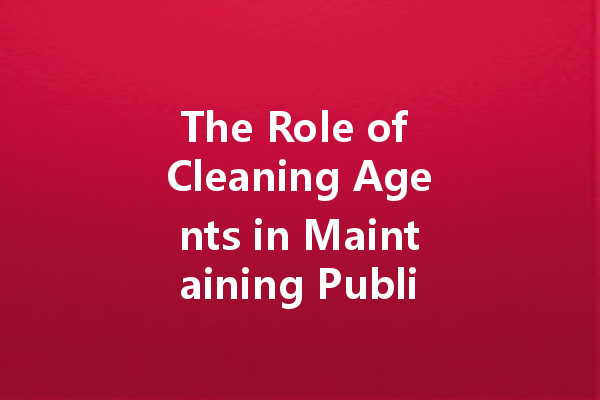Cleaning agents play a pivotal role in ensuring not only hygienic environments but also public health at large. As the world continues to face various health challenges, understanding the importance of these products becomes increasingly significant. This article delves into how cleaning agents contribute to public health and highlights the factors that make them effective.
Understanding the Importance of Cleanliness
Maintaining cleanliness in public spaces, homes, and workplaces is integral to promoting overall health and safety. Proper sanitation practices help prevent the spread of germs and viruses that can lead to illnesses. For instance, frequent cleaning of high-touch surfaces using appropriate cleaning agents can significantly reduce the risk of infections.
When communities prioritize cleanliness, they not only improve their immediate environments but also contribute to broader public health initiatives. This proactive approach ultimately enhances the quality of life for everyone, especially vulnerable populations like children and the elderly.
The Connection Between Cleaning Agents and Disease Prevention
Effective cleaning agents are essential in germ elimination and preventing the spread of diseases. Whether in healthcare settings, schools, or homes, disinfectants and sanitizers are formulated to target harmful pathogens. For instance, hospital-grade disinfectants help control infection rates by effectively eliminating bacteria, viruses, and fungi.
Key Ingredients for Efficacy
Many cleaning agents include specific ingredients like bleach, alcohol, or hydrogen peroxide, which are known for their antimicrobial properties. It’s crucial for these products to be used according to instructions, allowing adequate contact time to maximize their disinfecting potential.
Enhancing Public Awareness of Cleaning Products
Consumer education around cleaning agents is vital in promoting safe practices. Understanding the importance of using the right products and adhering to proper cleaning protocols significantly impacts public health outcomes.
Label Literacy
Labels on cleaning products often contain important information regarding safe usage, potential hazards, and essential ingredients. Educating the public to interpret labels effectively ensures they can select suitable cleaning agents for their specific needs and use them safely.
The Role of Non-Toxic and Eco-Friendly Cleaning Agents
The rising awareness of environmental issues has led to an increased demand for non-toxic and eco-friendly cleaning agents. These products aim to provide effective cleaning while minimizing adverse health impacts.
Healthier Alternatives
Non-toxic cleaning agents are formed without harsh chemicals that can cause respiratory issues, skin irritations, or long-term health complications. Formulations that utilize natural ingredients like vinegar, baking soda, or essential oils can be both safe and effective for everyday cleaning.

Switching towards eco-friendly options not only supports individual health but also contributes to environmental sustainability. Очиститель air and reduced chemical runoff from cleaning products can diminish pollution levels and improve the health of surrounding ecosystems.
Cleaning Agents in Healthcare Settings
In healthcare environments, the use of specialized cleaning agents is utmost in significance. Hospitals and clinics require stringent cleaning protocols to protect patients and healthcare workers.
Strategic Disinfection Protocols
In healthcare settings, the strategic application of cleaning agents includes regular cleaning schedules and disinfecting high-risk surfaces like examination tables, doorknobs, and patient equipment. Healthcare cleaning agents are typically designed to comply with regulations, ensuring that they effectively eliminate pathogens and contribute to a safer environment.
Public Spaces and Hygiene
Cleaning agents also play a vital role in public facilities such as schools, public transportation, and restaurants. Frequent cleaning and sanitizing of these environments are crucial in preventing outbreaks and ensuring community health.
Maintaining High Hygiene Standards
Facility managers are encouraged to implement routine cleaning schedules, using appropriate cleaning agents tailored to each environment’s needs. Clean public spaces not only foster a healthier atmosphere but also enhance public trust, encouraging individuals to engage more freely in their communities.
Technology and Innovation in Cleaning Agents
Advancements in cleaning agent technology are continuously improving their effectiveness against pathogens. Innovative formulations are being developed, taking advantage of science and technology in product design.
Умные решения для уборки
The introduction of smart cleaning technologies, like automated cleaning robots that utilize advanced cleaning agents, demonstrates a commitment to maintaining public health standards in a rapidly evolving world. Such innovations make it easier for businesses and public spaces to maintain cleanliness automatically and efficiently.
Conclusion: The Need for Integrated Cleaning Practices
In conclusion, cleaning agents are essential not only for maintaining cleanliness but also for protecting public health. They are integral in preventing the spread of diseases, ensuring safe environments, and promoting overall well-being. Moving forward, a combination of public awareness, educational initiatives, and advancements in cleaning technology will likely enhance the effectiveness of these products. Emphasizing responsible usage and proper selection of cleaning agents will ultimately contribute to healthier communities around the globe.
